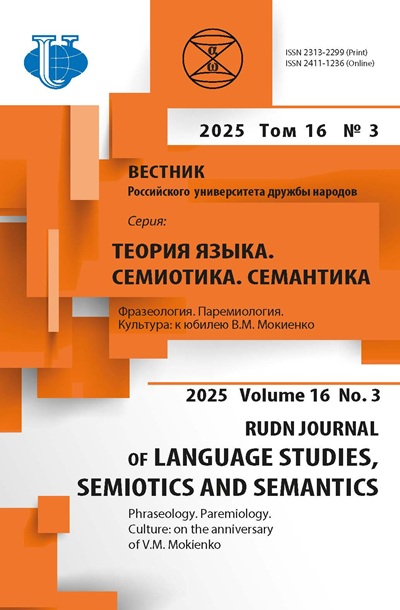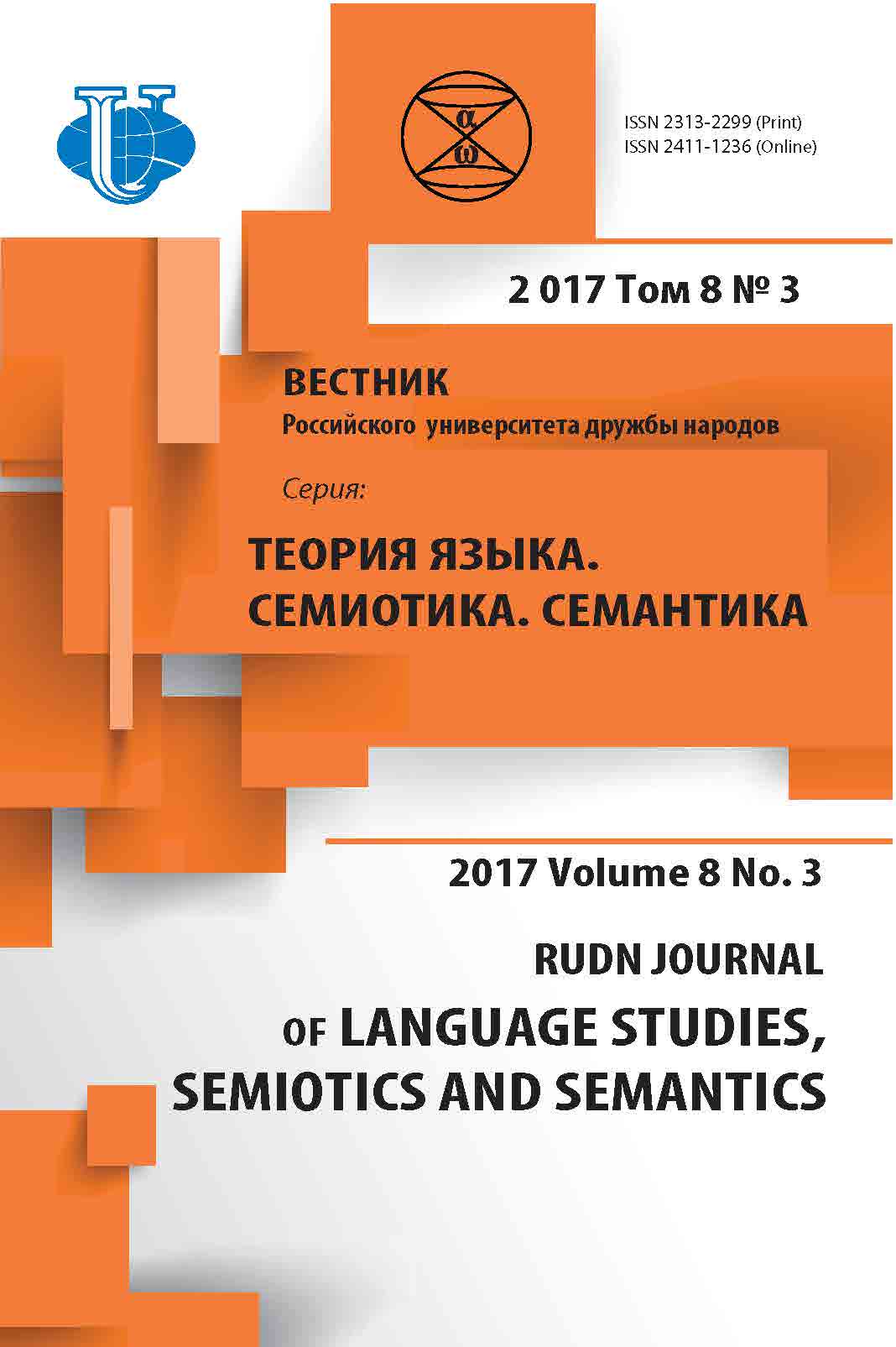СТАРАТЕГИИ ОТКАЗА В АНГЛИЙСКОЙ И РУССКОЙ ЛИНГВОКУЛЬТУРАХ
- Авторы: Илиади ПЛ1, Ларина ТВ1
-
Учреждения:
- Российский университет дружбы народов
- Выпуск: Том 8, № 3 (2017)
- Страницы: 531-542
- Раздел: СТАТЬИ
- URL: https://journals.rudn.ru/semiotics-semantics/article/view/17014
- DOI: https://doi.org/10.22363/2313-2299-2017-8-3-531-542
- ID: 17014
Цитировать
Полный текст
Аннотация
Об авторах
П Л Илиади
Российский университет дружбы народов
Email: ousailiadi@hotmail.co.uk
Илиади Параскеви-Лукерья, магистр кафедры общего и русского языкознания филологического факультета РУДН; научные интересы: прагматика, анализ дискурса, теория вежливости/не вежливости ул. Миклухо-Маклая, 6, Москва, Россия, 117198
Т В Ларина
Российский университет дружбы народов
Email: tatiana.larina@rudn.university
Татьяна Викторовна Ларина, доктор филологических наук, профессор кафедры иностранных языков филологического факультета РУДН, главный редактор журнала Вестник РУДН. Серия: Лингвистика; научные интересы: прагматика, анализ дискурса, теория вежливости/не вежливости, межкультурная коммуникация ул. Миклухо-Маклая, 6, Москва, Россия, 117198
Список литературы
- Al-Eyrani, A.A. (2007). Refusal strategies by Yemeni EFL learners. The Asian EFL Journal Quarterly, Volume 9, Issue 2, 19-34. http://www.asian-efl-journal.com/June_07_aaae.php.
- Al-Khatani, S.W. (2005). Refusals realizations in three different cultures: A speech act theoretically- based cross- cultural study // Journal of King Saud University, Volume 18, Lang. & Transl., 35-57.
- Austin, J.L. (1962). How to do things with words. Oxford, Oxford University Press.
- Beebe, L., Takahashi, T., & Uliss-Weltz, R. (1990). Pragmatic transfer in ESL refusals. In R. C. Scarcella, E. S. Andersen, & S. D. Krashen (Eds.), Developing communicative competence in a second language. New York, NY: Newbury House, 55-73.
- Brown, P. and Levinson S.C. (1987). Politeness: Some Universals in Language Usage. Cambridge: Cambridge University Press.
- Eelen, G. (2001). A Critique of Politeness Theories. Manchester: St Jerome Publishing.
- Eslami, Z.R. (2010). Refusals: How to develop appropriate refusal strategies. In A. Martínez-Flor & E. Usó-Juan (Eds.) Speech act performance: Theoretical, empirical and methodological issues (pp. 217-236). Amsterdam: John Benjamins.
- Ghazanfari M., Bonyadi A. & Malekzadeh Sh. (2003). Investigating cross-linguistic differences in refusal speech act among native Persian and English speakers. In: International Journal of Research Studies in Language Learning, 2013, Volume 2 Number 4, 49-63.
- Houck, N. & Gass, S.M. (1996). Non-native refusal: A methodological perspective. In: Gass, S.M. & Neu, J. (eds.) Speech acts across cultures. Berlin: Mouton de Gruyter, pp. 45-64.
- Houck, N. & Gass, S.M. (1999). Interlanguage refusals. A cross-cultural study of Japanese- English. Berlin: Mouton de Gruyter.
- Johnson, D.I.; Roloff, M.E.; Riffee, M. (2009). A. Politeness theory and refusals of requests: Face threat as a function of expressed obstacles. Communication Studies. 55 (2): 227-238. doi: 10.1080/10510970409388616. Retrieved October 12, 2016.
- Kecskes, I. (2014). Intercultural Pragmatics. Oxford: Oxford University Press.
- Larina, T. (2008). Directness, Imposition and Politeness in English and Russian. Cambridge ESOL: Research Notes: issue 33, August 2008. pp. 33-38. http://www.cambridgeesol.org/ rs_notes/rs_nts33.pdf.
- Larina, T. (2015). Culture-Specific Communicative Styles as a Framework for Interpreting Linguistic and Cultural Idiosyncrasies. International Review of Pragmatics, Volume 7, number 5. Special Issue: Communicative Styles and Genres, 195-215.
- Larina, T., Mustajoki, A. & Protassova, K. (2017). Dimensions of Russian culture and mind. In Katja Lehtisaari and Arto Mustajoki (eds.) Philosophical and cultural interpretations of Russian modernisation. Series: Studies in Contemporary Russia (Introduction chapter). Oxon/New York: Routledge. pp. 7-19.
- Leech, G. (1983). Principles of pragmatics. London: Longman.
- Leech, G. (2014). The pragmatics of politeness. Oxford: Oxford University Press.
- Leech, G. & Larina, T. (2014). Politeness: West and East. Bulletin of Peoples’ Friendship University of Russia. Series: Linguistics, 4, 9-34.
- Martínez-Flor, A. & Usó-Juan, E. (2011). Research methodologies in pragmatics: Eliciting refusals to requests // Estudios de lingüística inglesa aplicada, 11, 47-87.
- Sattar H.Q.A., Che Lah, S. & Suleiman, R.R.R. (2011). Refusal strategies in English by Malay University Students. GEMA Online Journal of Language Studies, Vol. 11(3), 69-81.
- Searle, J. (1969). Speech Acts. Cambridge: Cambridge University Press.
- Searle, J. & Vandervken, D. (1985). Foundations of illocutionary logic. Cambridge: Cambridge University Press.
- Sifianou, M. (1992). Politeness Phenomena in England and Greece. Oxford: Clarendon Press.
- Tanck, S. (2003). Speech acts sets of refusals and complaint: A comparison of native and nonnative English speaker’s production. TESL Second Language Acquisition, 1-22.
- Trosborg, A. (ed.). (2010). Pragmatics across languages and cultures. Berlin: Mouton de Gruyter.
- Umale, J. (2011). Pragmatic Failure in Refusal Strategies: British versus Omani Interlocutors’. Arab World English Journal, Volume 2, 1, 18-46.
- Wierzbicka, A. (1985). Different Cultures, different languages, different speech acts. Journal of Pragmatics, 9, 145-178.
- Wierzbicka, A. (2003). Cross-cultural pragmatics: The Semantics of Human Interaction. 2-nd edition. Berlin, New York: Mouton de Gruyter.
Дополнительные файлы












